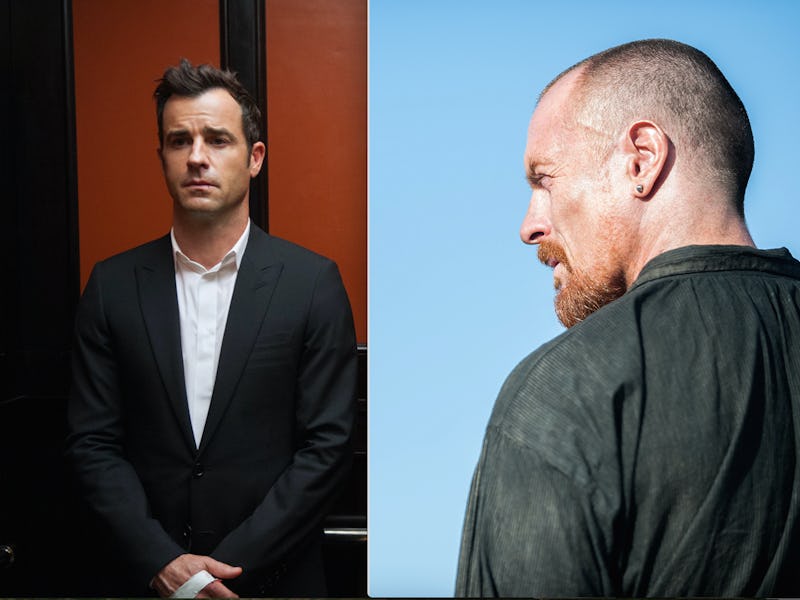'Black Sails,' 'The Leftovers,' and the Case for Short Shows
Why televisions two best dramas -- HBO's 'The Leftovers,' and Starz's 'Black Sails' -- make the case for shorter show runs.

Black Sails and The Leftovers are shows that don’t seem to have much in common. Though both are thought-provoking and deeply philosophical — featuring characters grappling with meaningful ways to live in an unjust chaotic world — the former is a political pirate drama set in the 1700s and the later is a modern post-apocalyptic tale (or rather, post world-changing disaster). But it’s no coincidence that they are the best shows on TV right now, and both will close before their respective five-season marks.
We could say their short run times and supreme quality speaks to the bloating problem in the age of peak TV, wherein longer episodes and seasons can mistakenly be equated to Art. You have seen countless shows in which you can practically hear the creators saying, “The audience won’t get this is Prestige TV if we don’t devote 10 minutes per episode to characters gazing pensively at rain!” That would be true. We could also say that the reason these particular shows make the case for “shorter is better” is that both endings are self-imposed by the original creators — Damon Lindelof for The Leftovers, Jonathan Steinberg and Robert Levine for Black Sails — which allows their visions to play out as they intended. That, too, is true. But really, it boils down to something far simpler: Both shows perfectly present the case against dicking around.
“Best shows on TV” simply means that they’re second to none in sheer craftsmanship. The quality of their writing, acting, storytelling, and cinematography; the way they work together to create episodes which you can’t help but internally linger on for days following. The way these exquisite hours stand on their own as genuine works of art while meticulously weaving season-long arcs — all while maintaining an unmatched level of character depth.
Of today’s most talked-about shows, Game of Thrones might be the biggest, but its character development the past two seasons (throwing Jaime’s by the wayside with his renewed proclamation of love for Cersei; having Jon barely changed by his brush with death) doesn’t measure up to Black Sails and The Leftovers. Preacher and Mr. Robot rightfully garner buzz as well, but their execution are less consistent. No part of Black Sails or The Leftovers is the least bit sloppy.
In quality, these two shows stand alone in the current landscape. But with The Leftovers capping after its third season and Black Sails after its fourth, they will likely be shorter than their compatriots.
Now, conventional wisdom would say that means they aren’t as successful. The Sopranos was six seasons; Friends — the most successful show for a time — was ten, Buffy The Vampire Slayer was seven; Game of Thrones will be eight. Meanwhile, Firefly and Deadwood both fell under the five-season mark, but both ended prematurely due to network intervention. Shorter is failure, right?
Not quite. Firefly and Deadwood are still discussed and held up among the greats, while Buffy’s seventh season was its weakest because it threw in a bunch of new characters nobody cared about (the Potentials) and proceeded to waste time dicking around with them. As Game of Thrones stretches on, it needs to get its shit together and stop dicking around by giving Tyrion pointless time-wasting scenes and Arya nonsensical plotting and characterization. True Blood, Dexter, The Vampire Diaries, Sons of Anarchy, and Supernatural stretched into seven-plus seasons — but their final stretches are the very embodiments of “dicking around.” Dexter never managed to make viewers care about Quinn, yet he increasingly ate up screen time. Sons of Anarchy’s final season featured so many needlessly padded-out minutes of characters exchanging vaguely meaningful looks over dead air, you could almost hear the clock ticking.
When a show has longevity, it often comes with an abundance of filler. Game of Thrones’s entire fifth season was filler (save the excellent “Hardhome”), for The Lord of Light’s sake. Luckily, it seems aware of that, because it will trim its fat with shorter final seasons.
But neither The Leftovers nor Black Sails wastes time on the non-essential. As is the nature of ensemble shows, both have some characters you care about more than others — Black Sails fans are divided on Eleanor and Leftovers fans have conflicting takes on Tommy — but unlike other longer shows with enough cast members to create Olympic teams, all have their parts to play in the narrative. Episodes contain no padding, because the show’s under-five-season runs force writers to trim the fat and focus on the essentials. Characters only stare pensively at rain when it legitimately adds to their story. The end results are lean, mean, and damned smart storytelling. It doesn’t hurt that both shows have the best music, either.
With 2016 being one of the weakest summer movie seasons in recent memory, it’s never been more apparent that television is the real gold. But if creators want that gold to stay shiny, they should follow the tight writing exemplified by The Leftovers and Black Sails — thanks, in no small part, to their looming endings — and forget the mistaken notion that longer is better. Great television is not a dick-measuring contest.